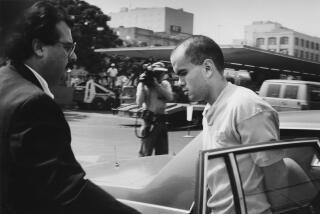Dependency Court: Prying eyes where once there were none
- Share via
I was surprised the other day to come upon a letter to the editor of the Los Angeles Daily Journal (March 26) that attacked, without naming me, my recent coverage of an important experiment underway in Los Angeles Dependency Court. In his letter (a similar though not identical version was submitted to The Times as a possible Op-Ed article), Whittier Law School professor William Wesley Patton argued that by identifying the father in a column I wrote recently about a Dependency Court proceeding, I had made it “possible for the community to identify” child victims of the father in a previous case, where he had lost custody. Patton decried my decision to name the father and said it argued for a new media ethics rule to prevent further such abuse.
Patton has long opposed openness in Dependency Court, so I wasn’t bowled over to learn that he’s not a fan of my work. In a couple of recent columns, I have contended that the welfare of children would be best served by allowing those proceedings to be as open as possible, and thus allowing those in the system to be held accountable for their work.
What was more surprising, however, was Patton’s slipshod research into the basic facts of the case I wrote about. The father I quoted -- who urged me to name him because he feels the system has thwarted his efforts -- does not share a last name with the children taken from him several years ago. They have long been adopted, and the details of their adoptions are protected by sealed adoption petitions. As such, it’s fairly hard to see how the “community” is going to identify these children.
Patton’s distortions didn’t stop there. He derided other advocates of open proceedings for seeming to be indifferent to the potential harm to a child who had to testify about intimate matters with a journalist present. But the shift to open hearings has not been absolute: On the first day I attended hearings under the new regime, one child was expected to take the stand. The judge, Amy Pellman, ruled that in that one case, there was potential harm to the child; she asked me to leave, and I did. For all other matters, I was allowed to stay. That’s not ignoring the needs of children. It’s striking a reasonable balance between the public’s interest in observing proceedings and the protection of children from possible harm.
This isn’t the first time that Patton has seemed not to know exactly what he’s talking about. On Jan. 30, Patton appeared before Michael Nash, the presiding judge in Juvenile Court and the person responsible for the new openness in Dependency Court. Patton urged Nash not to issue the order that has allowed the press to attend those proceedings.
There, Patton at first argued that Nash’s order would hurt children who wanted hearings to be private but whose lawyers failed to heed their wishes. Nash reminded him that all children in Dependency Court are represented by a highly regarded law center, then observed that if lawyers are ignoring their clients’ wishes, that’s hardly a problem confined to motions regarding closed proceedings. Patton then shifted to some constitutional arguments, which Nash dismissed (Nash had already admonishing those who wanted to speak that the hearing was not to be about the constitutional issues). Then Patton argued that the proposed order would cause delays, backlogs and budget shortfalls because lawyers would object to the presence of reporters and judges would be forced to hold extensive hearings.
Nash, clearly impatient, interjected: “What is the process now when someone wants to come to court?”
“They make a motion to enter,” Patton replied.
“Do we go through this whole rigmarole that you’re talking about now?” Nash asked.
“I don’t know,” Patton conceded.
“We don’t, OK,” Nash said. “Just so you know.”
The shift from holding almost all Dependency Court hearings in private to declaring a presumptive openness of those proceedings to the press is understandably upsetting to those accustomed to working in private. It is hard to have prying eyes where once there were none.
And yet, what is often lost in the resistance to change is what is most important. The interests of children are, of course, paramount in all of this, but those who side with Patton, in my view, see those interests too narrowly. Secrecy in Dependency Court has protected social workers, lawyers and even judges who perform poorly from being held to answer for their work. We would never tolerate such immunity from scrutiny in our adult and family courts, nor should we when the stakes are even higher -- the preservation of an opportunity for children who have done no wrong. In the end, the victims of secrecy in Dependency Court are children whose caretakers are allowed to fail them without consequence; the beneficiaries of a more open system would be children as well.
So far, the experiment in Los Angeles Dependency Court is bearing out that argument. Perhaps that’s why Patton distorts it.
ALSO:
Does secrecy serve the children?
For L.A. Dependency Court, a first: the press
Follow Jim Newton on Twitter
More to Read
A cure for the common opinion
Get thought-provoking perspectives with our weekly newsletter.
You may occasionally receive promotional content from the Los Angeles Times.







